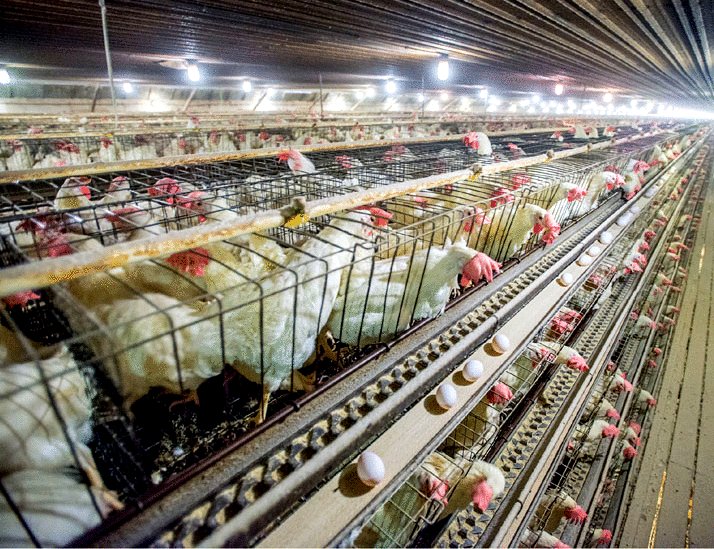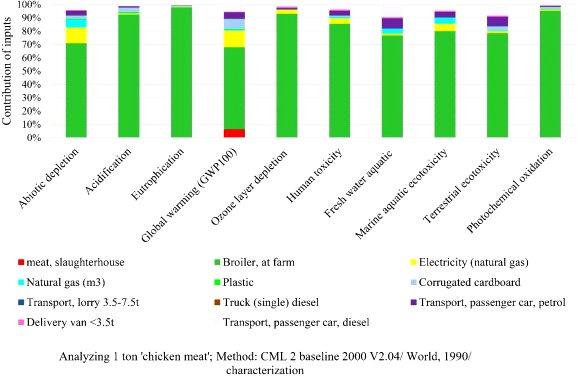Are You Wondering Why People Avoid Chicken? While chicken may seem like an irresistibly delicious food source, its consumption should be carefully considered - from ethical considerations, health hazards and environmental impacts - before consumption.
From antibiotic use in poultry farming to ethical dilemmas surrounding animal abuse at megafarms, there are multiple factors which make chicken consumption questionable and unsafe. Furthermore, environmental implications associated with chicken farming are staggering and worrisome.
We shall explore several reasons to make you reconsider including chicken in your diet. These reasons include its nutritional profile and potential health risks as well as its ethical ramifications such as factory farming practices, treatment of chickens, culling male chicks and resource consumption as well as greenhouse gases emissions and water pollution issues.
If you consume chicken regularly and haven't considered its wider-ranging repercussions, prepare to be amazed. Continue reading in order to discover all of the compelling arguments why forgoing it may be best for your personal health, the world at large and animals alike.
I. The Health Risks of Chicken Consumption
Chicken consumption as a regular diet may come as a shocker to some; its reputation of being healthy and uncomplicated belies its many hidden dangers that go largely unacknowledging by society at large. While health benefits of poultry intake should be recognized, more information needs to be revealed on potential negative health outcomes from eating chicken regularly.
Antibiotic usage in poultry farming
Antibiotic usage in poultry farming remains an area of great contention and debate in the US, as over 80% of all antibiotics sold are allocated to livestock. Alarming data reveals that antibiotics are frequently used to promote chicken growth and combat diseases prevalent in overcrowded coops - leading to superbug development which poses both public health threats and is resistant to antibiotic treatment.
Risk of cancer
As well as these issues, eating chicken has also been associated with an increased risk of cancer. A 2015 World Health Organization report indicated that any processed meat - including chicken - increases the risk of colorectal cancer; additionally, research conducted at Fred Hutchinson Cancer Research Center indicated eating grilled chicken may increase its likelihood.
Alternatives to chicken
As much as people enjoy chicken for its protein content, it's important to recognize there are numerous plant-based sources of protein such as beans, lentils, nuts, quinoa and tofu which offer significant health advantages, including decreased risks of heart disease, diabetes and certain cancers. Furthermore, such changes have long been documented.
"Thus, while chicken may appear like an ideal protein source, its consumption poses serious health risks. Switching to plant-based protein sources is proven to decrease exposure to antibiotic-resistant bacteria and cancer occurrence; providing smarter and healthier solutions than chicken alone."
Note: It's important to acknowledge and discuss the potential negative health outcomes from eating chicken regularly. By doing so, we can make informed choices and explore alternatives to improve our overall health and wellbeing.
Learn about chicken consumption health risks at pcrm.org.II. The Health Risks of Chicken Consumption
The ethical quandaries surrounding chicken consumption is complex. The chicken farming industry in particular poses numerous ethical concerns due to cruel and inhumane practices prevalent within this field. Most chicken farmers engage in factory farming practices which breed chickens under inhumane conditions that border on cruel.
Welfare of Chickens
Advocates consider the welfare of chickens a top ethical priority, given how their genetic modification leads to exponentially faster growth rates for meat production. Unfortunately, such breeding practices pose serious health challenges to these living beings, including leg and joint deformities leading to lameness that often result in chronic pain for these birds and eventually leads to their untimely deaths.
Male Chicks
Male chicks are considered inefficient for egg and meat production industries, leading to millions being killed using inhumane means such as suffocation, gassing or maceration - an unforgivable practice in which living birds are ground up alive - through cruelty and maceration. This trend has become all too evident due to the fundamental fact that male chicks don't produce as much meat than full grown broiler birds and thus are no longer marketable as meat products.
Debeaking and Overcrowding
Atrocious cruelty meted out to these birds throughout their lifetime is both incomprehensible and despicable. One such abuse is debeaking, which involves cutting off the tip of chicken's beak without anesthetic for no good reason - another shocking act against these innocent creatures. Furthermore, overcrowding, lack of ventilation and cramped transportation conditions that negate their wellbeing further diminish their wellbeing.
At its core, chicken farming poses complex ethical dilemmas that must not be taken lightly. Animal cruelty has become an omnipresent issue within this industry and minimal legal measures have been taken to protect animal rights. Therefore, in order to avoid being complicit in objectionable and inhumane practices in this realm, it is critical that sustainable chicken consumption be achieved through farming practices that prioritize bird well-being over profit maximization.
III. The Ethical Issues with Chicken Consumption
Chicken farming is an intricate industry with lasting environmental ramifications; ethical and health concerns remain apparent, while its potentially devastating environmental implications cannot be ignored.
Excessive Water Usage
Water is an indispensable resource that is indispensable to daily survival; yet, chicken farming's excessive use exacerbates water scarcity. This industry consumes vast quantities of water daily for both their own consumption as well as irrigation of feed crops destined for human consumption - estimated daily usage amounts to an astounding 4.3 billion gallons! In America alone.
Greenhouse Gas Emissions
Chicken farming poses another environmental obstacle by contributing to greenhouse gas emissions that play a major role in global warming. Production of chicken meat releases carbon dioxide and nitrous oxide gasses which further exacerbate global warming. Air pollution caused by industrial procedures associated with chicken farming as well as manure from chicken farming create life-threatening health effects on humans, wildlife and their environments.
Food Waste
Add to that, food waste within this industry has become an embarrassing spectacle, with most chickens going uneaten and unescorted to landfill sites or greenhouse gas emissions, fuelling an increase of both. 77% of water used in chicken farming is dedicated to animal feed production that eventually goes unutilized and becomes waste which pollutes our environment.
Conclusion
To conclude, the environmental impacts of chicken farming cannot be undervalued and we must all take them seriously. Resource-intensive agriculture cannot continue unabated, prompting us to make small but meaningful changes that make a real impact in terms of reduced environmental footprint. Altering our food choices - specifically by cutting back or replacing chicken consumption with plant-based alternatives can help lower carbon footprint and preserve our planet for future generations.
Chicken farming is one of the largest contributors to water pollution and deforestation; a reality that cannot be ignored if we are to safeguard our planet's future.
- Excessive water usage
- Greenhouse gas emissions
- Food waste
- Reducing consumption of chicken products
- Switching to plant-based alternatives
- Encouraging sustainable farming practices
IV. The Environmental Impact of Chicken Farming
With so many varying health, ethical, and environmental considerations related to chicken consumption requiring consideration of multiple viable solutions that adhere to one's principles and values relating to it, a nuanced and comprehensive approach should be adopted when making choices related to this food source.
Exploring Plant-Based Protein Sources
One possible approach is exploring plant-based protein sources, which have gained significant traction due to their health advantages and environmental benefits. These protein sources can lower the risk factors of chronic illnesses such as heart disease, diabetes, and cancer while relying minimally on resources such as water and land usage. Foodstuffs like lentils, tofu, beans and nuts are available and offer numerous solutions and versatility.
Alternative Meat Products
Locally and Organically Sourced Foods
Not to be neglected is the significance of locally and organically sourced food, both of which should be prioritized. Local sourcing helps foster an ethical, sustainable animal rearing practice while positively impacting local economies. Furthermore, supporting organic farming practices limits exposure to harmful chemicals, hormones, and pesticides that might otherwise pose risks to our health.
Conclusion
The complexity of public discourse surrounding chicken consumption requires alternative approaches that balance ethics, health, environmental impact, and animal welfare considerations. Plant-based protein sources, alternative meat options, and locally sourced animal products all offer potential solutions that could significantly improve well-being for their consumers while simultaneously mitigating mass production impacts.
Keywords: chicken, consumption, plant-based protein sources, alternative meat products, locally sourced food, organic, animal welfare, environmental impact, mass production
- Plan your meals
- Make a list
- Shop smart
Conclusion:
After careful analysis and observation, it has become evident that forgoing chicken consumption is necessary in maintaining a healthier and balanced lifestyle. Consuming poultry has numerous ethical as well as environmental and health implications that must be considered before engaging in its consumption.
The negative consequences of the chicken industry cannot be ignored, with adverse health and animal welfare consequences reaching critical mass. Additionally, environmental degradation caused by factory farming practices results in permanent pollution of soil, air and water resources.
However, it is vital that sustainable and ethical alternatives are found and tested as replacements for chicken. Plant-based protein options, alternative meat sources produced using less resource-intensive methods, and locally sourced organic food provide sustainable options that adhere to ethical and sustainable principles.
Giving up chicken requires individuals to become more informed and mindful when making choices, performing them intentionally with mindfulness, and understanding their larger connotations. Making more mindful food decisions has numerous positive outcomes such as better health, animal welfare protection and environmental conservation, plus becoming part of an international movement of ethical eating habits.




